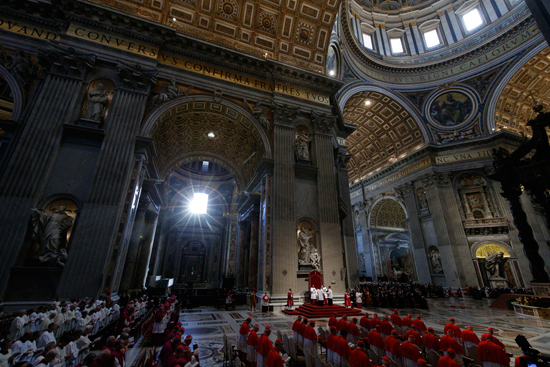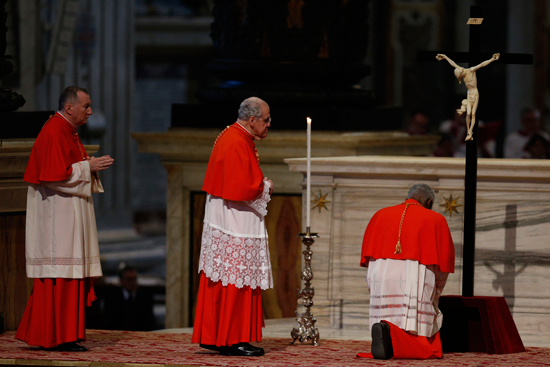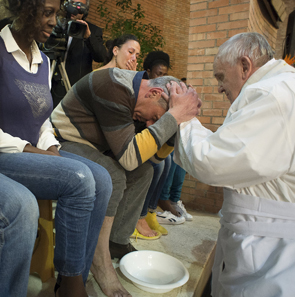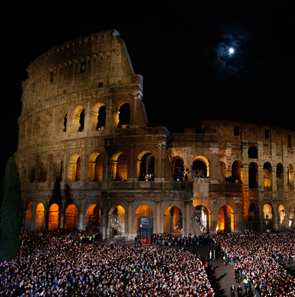As Catholics across the world commemorated Christ's Passion at services to mark Good Friday today, the preacher of the Papal Household told a Rome congregation that included Pope Francis that victims of conflict carry the Cross just as Jesus did.
Father Raniero Cantalamessa, who preached at the two-hour Good Friday ceremony, which Pope Francis presided over, linked the brutality of Calvary with the explicit brutality faced by suffering people. He urged people not to think of that suffering in abstracts - like hunger, poverty and injustice - but specifically to remember the horrors of individuals, "people with names and specific identities; of the tortures that are decided upon in cold blood and voluntarily inflicted at this very moment by human beings on other human beings, even on babies."
Speaking the day after 147 people, many of them students, were massacred by Islamic militants at Garissa University in north-eastern Kenya, near Somalia, Fr Cantalamessa said: "With fear and trembling, let us also say, 'Behold what we human beings are capable of!'"
Reflecting on that slaughter he added: "Jesus said to his disciples one day, “The hour is coming when whoever kills you will think he is offering service to God” (Jn 16:2). Perhaps never before have these words found such precise fulfilment as they do today."

Turning to the suffering of persecuted Christians, Fr Cantalamessa noted that many Western insitutions had failed in their duty to protect the vulnerable. But to denounce them today would, he said, betray the mystery of Christ's death on the Cross.
Instead he urged forgiveness and said: "This kind of forgiveness cannot seek recompense in the hope of divine punishment. It must be inspired by a charity that excuses one’s neighbour without, however, closing one’s eyes to the truth but, on the contrary, seeing to stop evildoers in such a way that they will do no more harm to others and to themselves.
We might want to say, 'Lord, you are asking us to do the impossible!' He would answer, 'I know, but I died to give you what I am asking of you. I not only gave you the command to forgive and not only an heroic example of forgiveness, but through my death I also obtained for you the grace that enables you to forgive.'"
He concluded: "True martyrs for Christ do not die with clenched fists but with their hands joined in prayer. We have had many recent examples of this. Christ is the one who gave the twenty-one Coptic Christians beheaded in Libya by ISIS this past 22 February the strength to die whispering the name of Jesus.
Lord Jesus Christ, we pray for our persecuted brothers and sisters in the faith and for all the Ecce Homo human beings who are on the face of the earth at this moment, Christian and non-Christian."

Francis is set to follow the Via Crucis, or the Way of the Cross, around Rome's Colosseum in the evening.
The Pope stops at 14 stations to commemorate the crucifixion and burial of Jesus and reflect on meditations or readings which were this year written by an Italian bishop emeritus, Renato Corti
On Maundy Thursday he washed and kissed the feet of 12 inmates, including six women at Rome's Rebibbia prison.
Earlier in the day he used his Chrism Mass homily to rally “dead tired” clergy.
Francis compared priests’ weariness to “incense which silently rises up to heaven”. “The tiredness of priests! Do you know how often I think about this weariness which all of you experience? I think about it and I pray about it, often, especially when I am tired myself,” he said.
He said that the gamut of emotions run by priests – from rejoicing with newlyweds to mourning with those burying a loved one – was heartbreaking and “can exhaust the heart of a pastor”.
“For us priests, what happens in the lives of our people is not like a news bulletin: we know our people, we sense what is going on in their hearts. Our own heart, sharing in their suffering, feels ‘com-passion’, is exhausted, broken into 1,000 pieces, moved and even ‘consumed’ by the people,” he added.
Francis, who according to the Italian news agency ANSA has been told by his doctors to eat less pasta, walk more and lose a little weight to ease his backaches, urged priests weighted down by pastoral work not to be tempted to rest “however we please”, but rather to turn to God in their exhaustion.
“Whenever a priest feels dead tired, yet is able to bow down in adoration and say: 'Enough for today, Lord', and entrust himself to the Father, he knows that he will not fall but be renewed,” he said.
The Pope, who has been criticised for not taking holidays, told priests today: “How difficult it is to learn how to rest!”
He went on: “Do I know how to rest by accepting the love, gratitude and affection which I receive from God’s faithful people? Or, once my pastoral work is done, do I seek more refined relaxations, not those of the poor but those provided by a consumerist society? Is the Holy Spirit truly 'rest in times of weariness' for me, or is he just someone who keeps me busy?”
Francis identified three main forms of weariness: “weariness of the crowd”, or being surrounded by people; weariness of enemies, or confronting evil; and “weariness of ourselves”, effectively giving up on oneself.
He concluded – after worrying “lest you be wearied by this homily itself!" – by asking priests to learn how to be weary "in the best of ways".
Above: The moon is seen over Rome's Colosseum as Pope Francis leads the Good Friday Way of the Cross. Photo: CNS photo/Paul Haring




 Loading ...
Loading ...